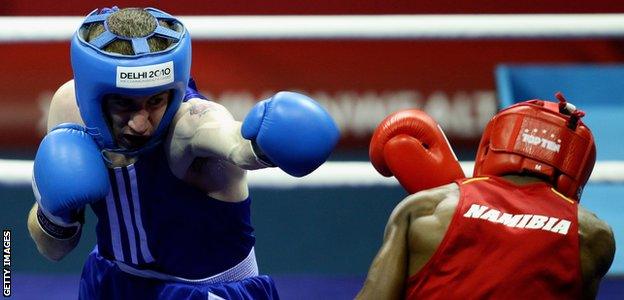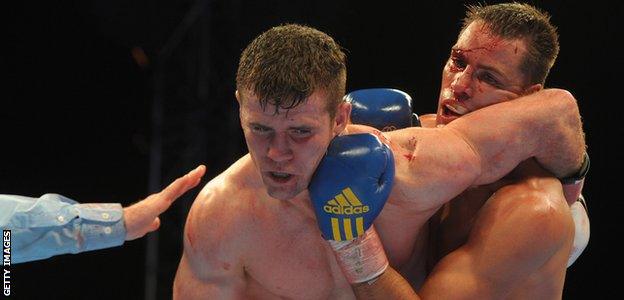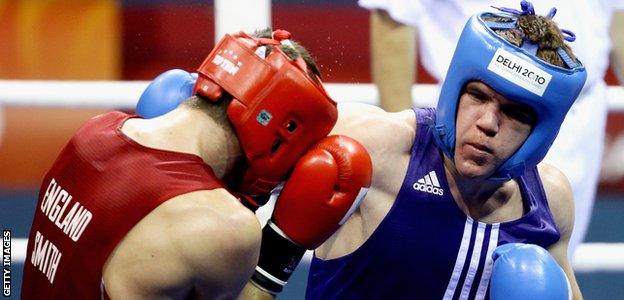The golden generation - memories of Northern Ireland's boxing triumph at Delhi 2010
- Published
Ten years on: When O'Kane led NI to boxing glory in Delhi
Michael Hawkins knew his team had every chance of success at the 2010 Commonwealth Games.
After all, it was Hawkins who had masterminded Northern Ireland's last boxing success at the tournament in Canada some 16 years earlier.
Back in 1994 Hawkins was the head coach of NI's boxing team for the Games in Victoria that would see Neil Sinclair and Jim Webb return home with gold medals.
Few would have predicted then than the 2010 team would be heading to Delhi in search of Northern Ireland's first golds in the ring since Sinclair and Webb had their hands raised.
Hawkins was invited back to lead the team once more, this time alongside Stephen Friel, and he saw enough in the build-up to know that medals were there to be won.
"Our preparation for Delhi was excellent," recalls Hawkins.
"The team came together a few months before the Games which started in October.
"We worked through the summer - six weekends in Dublin with the high performance unit and then in August and September we trained down there for four days a week.
"It was great prep, there are top coaches and top boxers down there and it was a great environment to be in, mixing with the best."
A golden generation of talent
The squad was filled with exciting young talent across the weight divisions, each one a genuine medal contender.
Alongside the potential was pedigree, and it wasn't just Hawkins who had experience of getting the job done in a major competition.
Paddy Barnes was already an Olympic medallist having claimed bronze in Beijing two years earlier, and was identified as someone who could help forge the winning mindset within the 2010 group.
"I could see how well he managed the weight, he was brilliant," says Hawkins.
"When fighters might have had an ice cream as a treat during competition he would have had a quarter of a lolly as his treat. That's how focused he was."
At just 23, Barnes was one of the squad's most experienced heads helping to guide a number of young fighters who have since become established professional names, including prospective world title challenger Michael Conlan, Paddy Gallagher, Tommy McCarthy, Tyrone McCullough and Steven Donnelly.

Barnes was one of the most recognisable names in the 2010 squad
While Barnes was a senior figure, the team captaincy fell to Dungiven's Eamonn O'Kane.
Four years before Delhi, O'Kane travelled as part of the squad to Melbourne and missed out on a Commonwealth bronze medal in a controversial decision.
The defeat did not sit well with O'Kane, who approached the 2010 Games feeling as though he was underestimated within his division, and that there was a score to be settled.
Going into the Games, O'Kane was aware of the team he had around him, the stable of amateur fighters with the ability to drive each other into the business end of the competition.
"The whole team were competing against each other in training, we were all motivating each other, winding each other up and we had great craic," says O'Kane, who won inter-continental titles as a professional before retiring in 2016.

O'Kane held inter-continental titles as a professional, and was chief support on the undercard of Carl Frampton's 2014 world title fight in Belfast
"The whole thing just gelled really well. Mickey Hawkins and Stephen Friel and the whole team around us, from Paul McMahon helping to get everything we needed, everything we wanted, the training camps before it down in Dublin, all the competition with the Irish High Performance team.
"Everything just for me clicked and fell into place and definitely ended up probably one of the highlights if not the highlight of my career."
It was by no means a seamless tournament, with Conlan, Donnelly and McCullagh among those to fall to disappointing defeats in the early stages.
However, as finals day rolled around, Northern Ireland found itself with five boxers fighting for gold medals.
McCarthy and Ward would both be forced to settle for silver however it was, perhaps predictably, Barnes who set the tone.
With an 8-4 win in the light flyweight final Barnes broke NI's 16 year duck, with Gallagher producing a scintillating display to defeat current super-middleweight world champion Callum Smith to double his team's tally.

Paddy Gallagher secured NI's second gold medal of the tournament with an excellent win over Callum Smith
Last up was O'Kane, who found himself up against heavily fancied Englishman Anthony Ogogo.
"Well Anthony Ogogo was this star, this celebrity, from before the Games and he was one of the guys tipped for gold, between him and the World Number 1 Vajinder Singh," says O'Kane.
"It was as if it was a forgone formality that he was going to win but I looked at his style. I'd watched him and throughout the competition and seen him before and how I boxed against different styles and I thought 'you know what, I can beat this guy, I see chinks in his armour and they suit my style.'
O'Kane delivered arguably the most memorable display of his entire career inside the ring, dominating Ogogo from start to finish to catapult Northern Ireland to their third boxing medal of the Games with an emphatic 16-4 win.
"In boxing terms I destroyed him," he recalls.
"He suited me down to a tee and it just worked really well."
Returning home with five medals, three gold and two silver, Northern Ireland had delivered the goods in a sport in which they are known to punch well above their weight.
A raft of world class talent have represented NI in multiple Commonwealth Games through the years, but the class of 2010 may just go down as the best of the whole bunch.